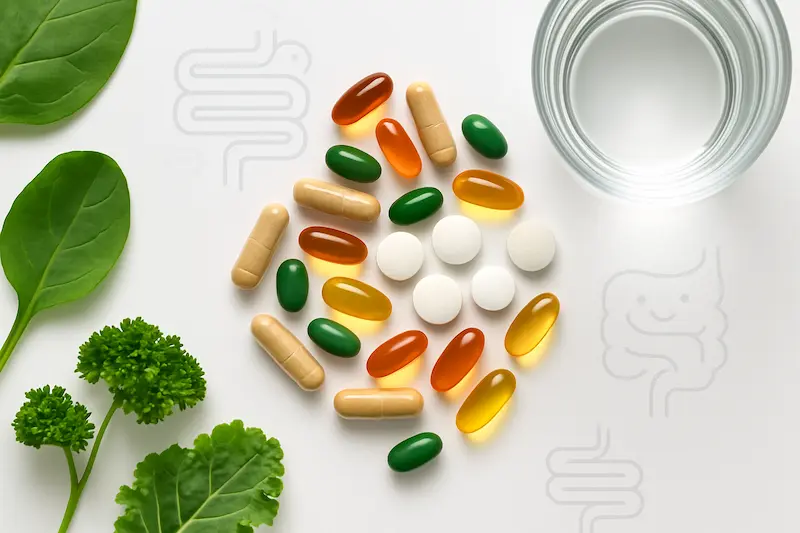If you’ve ever found yourself standing in front of a supplement aisle wondering if any of it is actually worth your money… same.
Let’s be honest: most gut health supplements are either overpriced nonsense or barely effective for 90% of people. But some have legit science behind them — and a few may actually help with digestion, bloating, mood, and even brain fog.
Below are 7 gut health supplements that aren’t total BS — plus when to use them, when to skip them, and what to look for in a quality brand.
⚠️ Disclaimer: This article is not medical advice. Always chat with your doctor or dietitian before starting new supplements, especially if you’re on medications or have a chronic condition.
1. Probiotics
Best for: Bloating, digestion, antibiotic recovery
These are the OG gut supplements, and while not all probiotics are created equal (seriously, some are just glorified yogurt dust), certain strains do have solid research backing them.
✅ Look for multi-strain formulas with at least 10 billion CFUs.
✅ Bonus if they include Lactobacillus rhamnosus GG, Bifidobacterium lactis, or Saccharomyces boulardii.
💊 Try: Seed Daily Synbiotic or YourBiology Gut+
(Yes, affiliate links. Yes, we’re paying rent with your clicks. Thanks!)
2. Prebiotics
Best for: Feeding your good bacteria
Think of these as fertilizer for your gut. Prebiotics are non-digestible fibers that help your existing good bacteria thrive.
🌱 Common sources: Inulin, FOS (fructooligosaccharides), resistant starch
✅ Helpful for people with poor diet diversity.
⚠️ May cause bloating if introduced too quickly.
💊 Try: Now Foods Prebiotic Inulin Powder
3. Digestive Enzymes
Best for: Bloating, after-meal discomfort, food sensitivities
These help break down food more efficiently — especially helpful for people with enzyme deficiencies or sluggish digestion.
✅ Look for broad-spectrum blends (amylase, protease, lipase, lactase, etc.)
⚠️ May not be necessary if your digestion is normal.
💊 Try: Zenwise Digestive Enzymes with Probiotics & Prebiotics
4. L-Glutamine
Best for: Leaky gut, post-antibiotic recovery, inflammation
This amino acid fuels intestinal cells and supports gut lining integrity. Some early studies show promise in reducing permeability (“leaky gut”) and calming inflammation.
✅ Best taken on an empty stomach in powder form
⚠️ Long-term use needs more research
💊 Try: L-Glutamine Powder
5. Magnesium (Glycinate or Citrate)
Best for: Constipation, stress, sleep
Magnesium helps relax muscles — including your digestive tract. It’s a gentle, non-habit-forming way to keep things moving and chill you out before bed.
✅ Glycinate = best for sleep & anxiety
✅ Citrate = better for constipation
💊 Try: Magnesium Breakthrough by BiOptimizers or Doctor’s Best Magnesium
6. Zinc Carnosine
Best for: Gut lining repair, acid reflux, ulcers
This combo of zinc and the amino acid carnosine has shown promise in healing gut tissue and supporting the mucosal lining.
✅ Often used in Japan for ulcer treatment
⚠️ Not the same as regular zinc!
💊 Try: Doctor’s Best PepZin GI
7. Vitamin D3
Best for: Immune function, mood, inflammation
You probably know it for bone health, but Vitamin D also modulates the immune system — which is tightly connected to gut health. Many people are deficient, especially in gloomy climates (lookin’ at you, Ireland 👀).
✅ Take with a fatty meal
✅ Ideal blood level: 30–50 ng/mL
💊 Try: Thorne Vitamin D3 + K2 Drops
Bonus: What NOT to Waste Your Money On
🚫 “Detox” Teas and Powders – If you have a liver and kidneys, you’re already detoxing.
🚫 Colloidal Silver – Please. Just… no.
🚫 Supplements that claim to “cure leaky gut” in 3 days – Red flag city.
Final Thoughts
Supplements can support gut health — but they don’t replace fiber, movement, stress reduction, or decent sleep. If you’re living on ultra-processed food, no pill is gonna fix that.
But when used wisely, these 7 options might give your gut the nudge it needs. Especially if paired with some leafy greens and an actual bedtime.

Alex Keane is a health writer and gut health researcher with a personal mission: help people stop feeling like garbage for no clear reason. After years of dealing with brain fog, digestive issues, and 3am anxiety spirals, Alex started digging into the connection between the gut and the mind — and never looked back.
When not writing about microbiomes, Alex is usually found experimenting with fermented foods, walking obsessively, or trying not to buy more supplements off Instagram.
Alex is not a doctor, and that’s probably for the best.

